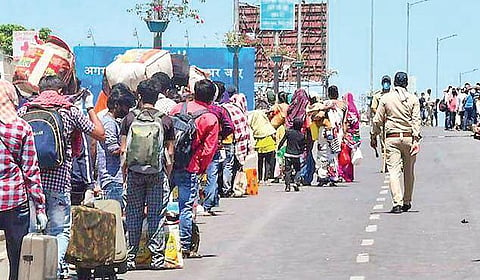

NEW DELHI: Migrant workers in Delhi faced harassment for rent during the lockdown but many are still willing to return to cities in absence of livelihood opportunities at villages, according to advocacy group Housing and Land Rights Network (HLRN).
Sixteen per cent of the respondents were harassed by home-owners for rent during the lockdown despite clear directives from the government directives not to do so.
Over 12 per cent said direct loss of housing, including through eviction by home-owners was one of the main reasons why they left Delhi during the lockdown, said the report ‘In Search of Home: A Study on Migrant Workers’ Access to Housing and Land’.
As part of the survey, HLRN interviewed 248 migrant workers aged between 15 and 78 years, including those who left Delhi, and a small number of them who stayed back. Lack of access to adequate housing and land also contributed to mass exodus from cities, it said.
The respondents were from Bihar, Uttar Pradesh, Assam, West Bengal, Chhattisgarh, Rajasthan, Madhya Pradesh, and Maharashtra.
Despite the crisis faced in cities, 83 per cent of the workers were willing to return for work in the absence of livelihood opportunities and access to land in their villages.
Most migrant workers lived for a considerable period of their lives without access to adequate housing with 44 per cent of them living in Delhi for at least 10 years or more, with or without their families.
A large number of migrant workers do not have access to adequate housing in their villages as well, it said.
While over 85 per cent of the workers were living in rented rooms in Delhi, including in ‘informal settlements’, over 4 per cent of the participants lived at their place of work, the survey said.
“Most of these living arrangements were not adequate and did not provide any tenure security to the residents. If they had some form of security of tenure, their right to housing, including during the lockdown, would have been protected.”
Eight-eight per cent of the respondents said they wanted the government to guarantee employment and also provide more livelihood opportunities in both urban and rural areas, according to the study.
Over 60 per cent people highlighted the need for affordable housing to avoid a similar crisis in future.
The HLRN suggested developing a comprehensive right to housing policy for providing affordable and adequate housing for all, with a focus on the most marginalised and excluded.
It added there was a need to conduct extensive surveys and collect data on the number of migrant workers.